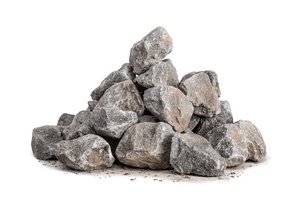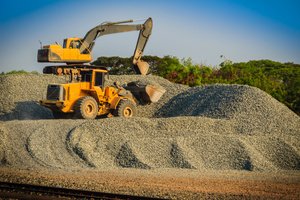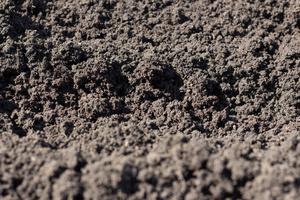Crushed stone is a highly versatile product that can be used for a broad range of functions, whether it is purely ornamental in landscaping or serving as a base material for pavers or roads. It comes in a variety of grades that are determined based on the stone size after it has been crushed. These numbers serve as a guide to the best applications for the stone in question. Many of these gradations refer to a range of stone aggregates sizes rather than a specific size for every piece.
What Is #57 Stone?

One of the most popular crushed stone aggregates that is used for construction and landscaping is #57 stone. The number 57 refers to the size of the sieve that is used to screen and sort the stones. #57 stone is roughly 1 to 1.5 inches in size, with individual stones that are approximately the same size as quarters and nickels. This stone material can be made of quartzite, argillite, washed gravel, granite or limestone; #57 crushed concrete is also available.
#57 Stone Fill Materials
There is no shortage of applications for this versatile stone size. It can be seen in everything from the bases of asphalt roads, driveways and sidewalks to asphalt paving and concrete. It is also a good choice for roads or driveways that will not be paved as its irregular, angular shape enables it to mesh together well and hold its shape on flat surfaces, making it relatively stable. It is also often selected in places where drainage is needed, such as French drains or septic drainage fields.
Many times, this type of stone is not used on its own. Instead, it is combined with other types of fill materials in order to give it the properties needed for the project at hand. Fill materials such as stone dust are sometimes used to reduce void contents in stone aggregate.
For example, in making gravel driveways, professional contractors typically use a blend of different-sized stones to create an efficient surface with sound drainage qualities and better durability. In many cases, a driveway will have three different gravel sizes. #57 often makes up the middle layer of a gravel driveway because it creates the ideal substrate and promotes efficient drainage. It will be placed on top of a base layer that is typically made of #3 or #4 gravel.
The top layer of gravel driveways – the part that everyone sees and walks or drives on – is made of smaller gravel stones and rock dust that fit together to create a tightly bonded surface that will hold up to everyday use. The fine aggregates are also what give the driveway its appearance. In many cases, they will be chosen on account of how well their color pairs with the home and nearby hardscapes.
Here is a closer look at some of the best materials to mix with #57 stone as fill.
Fine Aggregates
Fine aggregates are made up of finer fragments of rocks that have passed through the #4 sieve yet are bigger than those from a #200 sieve. They are typically mixed with coarse aggregates in creating hot mix asphalt or Portland cement.
2NS sand is used as a base material for concrete pavers and for elevated sewage disposal systems. It can also be used to provide traction in slippery road conditions as ice control sand.
Mason sand is used to make mortar, as bases or joints for pavers, and in landscaping.
Dense Graded Aggregates

Dense graded aggregates consist of rock fragments that are smaller than 1.5 inches. They are used because they can be compacted quite tightly and are remarkably stable, making them suited to road bases and shoulder work.
Crushed asphalt is used as a surface course for driveways, walkways, roads and parking lots. Because oils in asphalt can get hot on warm or excessively sunny days, some of the fines can bind together; crushed asphalt is a lot less dusty than natural road gravel products and crushed concrete.
21AA crushed concrete is mainly used for road construction. It packs and drains well and is good for bridging wet areas as well as creating a surface layer on parking lots and driveways.
21AA crushed stone is used for driveways, parking lots and gravel roads as well as a base beneath asphalt paving.
22A crushed stone is a good choice as top course for roads, parking lots and driveways. Although it is quite similar to 21AA crushed concrete, its particles are smaller and it tends to have more fines, allowing it to create a better driving surface. It is also suitable for use beneath asphalt paving.
Coarse Aggregates
Aggregates that contain particles that are less than three inches in diameter are suitable for many purposes.
5/8′ washed pea stone is considered a top-notch fill material and is ideal for drainage, landscaping, dog runs, walkways and playgrounds.
6AA limestone is used for sewer tile and storm drainage as well as landscaping.
1/2′ crushed stone is often available with or without dust. The clean variety contains no dust and is typically used to overlay driveways or backfill retaining walls, while the version with dust is a good base material for retaining walls as well as patio pavers.
Topsoil and Dust

Here is a look at some of the types of topsoil and dust varieties that can be used as fill.
Unscreened topsoil can be used as a fill for raised garden beds or for building up any low-lying areas or holes in a yard.
Screened topsoil is used in a wide range of yard and garden applications thanks to its ability to allow nutrients and water to flow naturally to plants so they can grow and thrive.
Stone dust or fine crush is often used as the base material in block and brick pavers as well as certain types of sports playing fields.
Reach Out to the Experts at Dirt Connections for More Information
Before embarking on your next project, get in touch with the experienced contractors at Dirt Connections for assistance in determining the right type of stone and fill needed to successfully complete your work.
Summary

Dirt Connections was started with one goal in mind: providing quality residential and commercial construction services to clients on time and on budget. Reach out for more information on how we can support your next project.
For your convenience our estimates are free and by appointment. Call 703-940-9949 for a free estimate today!









































